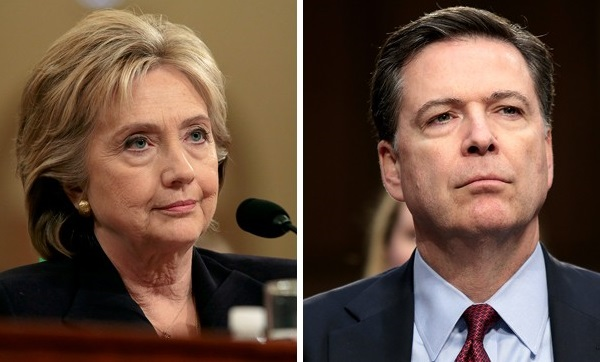The federal Code of Judicial Conduct applies to all Article III judges—except members of the Supreme Court of the United States. Is that because Supreme Court justices do not need ethics? No. Is it because they are better human beings, citizens, and jurists than their lower court colleagues? No.
Consider recusal when judicial bias is asserted…
Elections
Quote of the Day
Dale Franks, Vote Properly, You Virulent Racist!:
But let’s go even further. Even if you could prove that, on balance, free trade is an unquestionable economic benefit, people might still prefer to be measurably poorer if that’s the price that must be paid to maintain their traditional social and political cultures. (This has even more relevance in the case of the EU, because the EU actually has power. Imagine if NAFTA had an unelected Commission in Ottowa or Mexico City that could impose laws on the United States.) Perhaps people don’t regard their economic interests as important as their national or cultural interests. It doesn’t matter what elite opinion thinks the people’s most important interests are. In a democratic society, ultimately, it only matters what the people think they are. People get to determine their own priorities, and not have them dictated by elites. The people get to answer for themselves the question, “In what kind of country do I want to live?”
Of course, I would argue that we don’t have truly free trade or, increasingly, a free economy in the United States. The Progressives always look at the rising income inequality and maintain that it’s the inevitable result of capitalism. That’s hogwash, of course, and Proggies believe it because they’re dolts. But the problem in this country isn’t free trade—we have precious little of it—or unrestricted capitalism, since we have precious little of that as well. The issue behind rising income inequality isn’t capitalism, it’s cronyism. Income isn’t being redirected to the 1% because capitalism has failed, it’s happening because we abandoned capitalism in favor of the regulatory crony state and its de facto collusion between big business/banking interests and a government that directs capital to favored political clients, who become “too big to fail”. It doesn’t matter, for instance, whether the president is a Democrat or Republican, because we know the Treasury Secretary will be a former—and future—Goldman Sachs executive.
Franks’s post is very well thought through and ties together the main themes that appear to be driving US, British and European politics. It’s worth reading in full if you haven’t yet done so.
Clinton Comey?
[ cross-posted from Zenpundit — questions relating to the ongoing CBz discussion, FBI Kills Rule of Law — Refuses to Indict Hillary Over Her E-mails — with a side dish of Tzipi Livni ]
.
photo credit: Greg Nash via The Hill
I’ll be socratic here, asking questions to illuminate my hunches.
**
I’m seldom fully convinced by anything that comes from the left and reads the way I’d expect the left to read, and seldom convinced by anything that comes from the right and reads the way I’d expect the right to read, so I don’t take the left’s assertions downplaying H Clinton‘s security behavior with reflex belief, and on the whole I’m inclined to follow John Schindler, who — both as an ex-NSA analyst and as a regular at The Observer — takes a very hard line on Clinton’s security behavior, writing just a couple of weeks ago under the title, The Coming Constitutional Crisis Over Hillary Clinton’s EmailGate.
I also follow War on the Rocks, though, and was struck a while back by a post there from Mark Stout, drawing some interesting distinctions in line with its subtitle, “A former intelligence analyst who worked at both the CIA and the State Department explains how different approaches to classifying information sits at the heart of the scandal that threatens to undo Hillary Clinton.”
Which does somewhat complicate matters, while somewhat helping us understand them.
**
I’m neither an American nor a lawyer, and as someone who is generally inclined more to bridge-building than to taking sides in any case, I don’t feel qualified to debate the Comey-Clinton affair but was interested to see emptywheel’s Marcy Wheeler, whom I take to be leftish, coming out today describing Comey‘s decision as an “improper public prosecutorial opinion”. She writes:
Understand, though: with Sterling and Drake, DOJ decided they were disloyal to the US, and then used their alleged mishandling of classified information as proof that they were disloyal to the US ..Ultimately, it involves arbitrary decisions about who is disloyal to the US, and from that a determination that the crime of mishandling classified information occurred.
Comey, in turn, seems to have made it pretty clear that “Secretary Clinton or her colleagues“ were extremely careless in their handling of very sensitive, highly classified information” specifically:
.. seven email chains concern matters that were classified at the Top Secret/Special Access Program level when they were sent and received. These chains involved Secretary Clinton both sending emails about those matters and receiving emails from others about the same matters.
**
Is there, in your views, special treatment in this matter for persons of high rank present here?
And out of curiosity, if so, do you see a similar case of special treatment for persons of high rank over in the UK, known to be substantially less Israel-friendly than the US, where Scotland Yard wanted to question Tzipi Livni about alleged Israeli war crimes in Gaza under her watch as Foreign Minister, and “after diplomatic talks” Livni was “granted special diplomatic immunity”?
**
On the one hand, I don’t like show-trials, trials-by-press, banana courts or mob justice, and far prefer just laws justly applied and on the other, I can understand that the scrutiny those in high office find themselves under can render them legally vulnerable in ways that may unduly influence their decision-making and justice may be platonically blind, but is not always uniformly applied in practice. Such, it seems to me, is the human dilemma.
What say you?
Seth Barrett Tillman: Reflections on the Revolution in the UK: Parts 3 and 4
Part 3: Farage’s Poster Is Racist:
Farage was called a racist (and worse [1 minute mark]) for this poster.
Yet, no one claims this photograph was a fake, i.e., a staged photograph made with actors and props. No one claims that it was photoshopped. No one claims that the skin tone of the people in the photograph was altered or, even, darkened. No one claims that the photograph was out of date. And no one claims that the picture is not representative of the pattern of large scale immigration coming into the European Union (here, Slovenia—an EU member state) from the Third World.
In other words, if you reproduce a photograph of an actual, recent event, you are a racist…
and
Part 4: Errors of the Labour Party and the Remain Camp:
A fictionalized exchange on television between any Labour candidate for MP and an audience member during the 2015 general election …
[. . .]
Labour Candidate for Parliament: I understand. New immigrants—frequently coming without skills that fit the modern U.K. economy—cause wage compression at the low end of the wage scale. We will make sure employers pay the minimum wage; we will ensure that your economic interests are protected.
Audience Member: No, that’s not my point (at least, that’s not my only point). I don’t like how our society is being changed by mass immigration. I don’t like polygamy. It is illegal, but no one gets prosecuted for it. I don’t like FGM. It too is illegal, but it is not actively prosecuted. I don’t like it when the immigrants’ customs are accommodated in these ways—I don’t want our criminal laws ignored by the immigrants or by the police and the prosecutors. It makes me feel unsafe—it makes me think the immigrants’ way of life is preferred over ours. The immigrants should be integrated into our communities, not the other way around.
Labour Candidate for Parliament: I understand. We will work to ensure that your wages are not compressed.
Audience Member: You’re not listening. That’s not what I said: I don’t like the direction your party’s immigration policies under Blair & Brown have taken our country. I don’t like where we are now as a result—not that Cameron has done anything to modify those policies.
[. . .]
Read the whole series.
Seth Barrett Tillman: Reflections on the Revolution in the UK
The first two posts of a five-post series:
Part 1: It Is All Cameron’s Fault:
Finally, you might ask why did Cameron promise the referendum in his party’s election manifesto? It is simple. Even with the promise of a referendum, Cameron barely overcame the UKIP surge: a 3.8 million vote surge. It was only by peeling off voters from UKIP—through the promise of the in-out referendum—that made him PM. Had he not made this election pledge, any number of marginal Tory seats would have tipped: Labour, Lib-Dem, or UKIP. There was no blunder here by Cameron. It was not the referendum which destroyed Cameron’s ministry; rather, it was the promise of a referendum which made Cameron the Prime Minister in the first instance.
[. . .]
Parties who have been rejected at the polls twice should engage in meaningful introspection, at least, if they expect to be taken seriously in the future. The let’s put all the blame on Cameron position lacks just the sort of gravitas that one hopes to see in serious opposition parties.
and
Part 2: The U.K.’s Bradley/Wilder Effect Is Enough To Swing Elections:
If a society permits those who engage in wilful violence and those that command the police & the revenue office to drive normal political expression underground, then that society will not have normal political expression. One consequence of the lack of normal political expression is that every poll will lack validity.*
(Related: Brexit, Predictions and Trump.)

